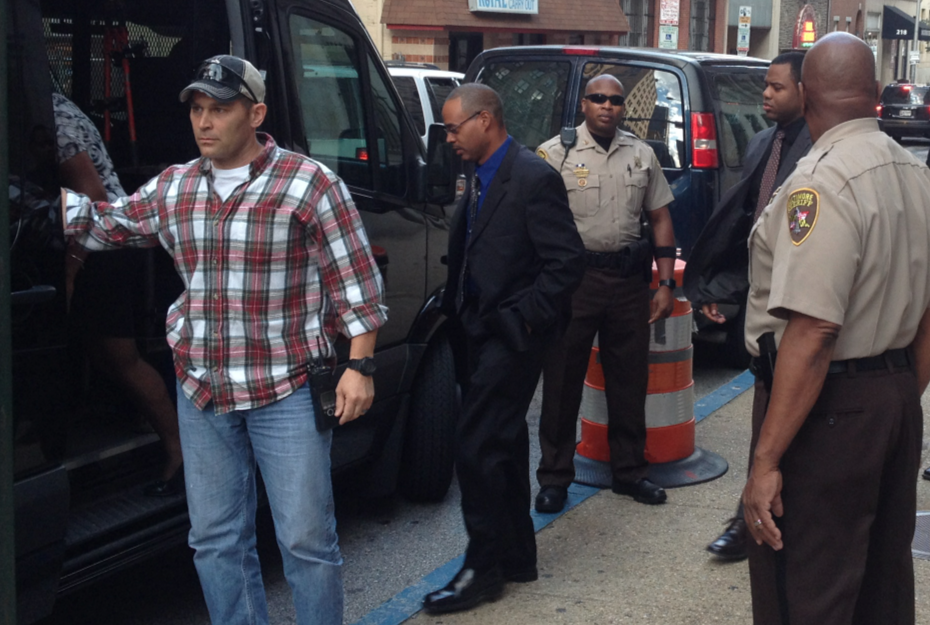
*Update, 10:08 a.m: The Maryland Court of Special Appeals postponed Officer Caesar Goodson Jr.’s trial Monday morning, scheduled to begin today with jury selection, pending the court’s final ruling on whether fellow Baltimore police officer William Porter can be compelled to testify as a prosecution witness.
Maryland Judiciary Office of Communications and Public Affairs deputy director Terri Charles told Baltimore magazine that no timeline has been set in the rescheduling of Goodson’s trial as of yet. Initially, a three-judge, Maryland Court of Appeals panel was expected to rule on Porter’s testimony sometime this week or next while Goodson’s trial was underway. Charles said Monday that the state Court of Special Appeals has now asked Porter’s defense attorneys and city prosecutors to file briefs on the matter and that an oral argument hearing will be scheduled before the court rules on whether Porter can be compelled to testify in the Goodson’s trial.
In temporarily staying the start of Goodson’s trial, the Court of Special Appeals wrote that “it is presumably in the interests of all parties” . . . that “the State’s motion to compel the testimony of William Porter be decided be before the commencement of the trial.”
“We’re not allowed to speculate on when the [oral arguments] hearing may take place or what date the trial may rescheduled for,” Charles said.
Porter was the first of the six officers tried on charges related to the death of Freddie Gray. His case ended in a deadlocked jury and his retrial has been reset for June. Prosecutors have said that Porter is a material witness in their cases against Goodson and Sgt. Alicia White, whose trial is scheduled to follow Goodson. Porter’s attorney’s have argued that their client has a fifth amendment right against self-incrimination that he can invoke to avoid being put on the witness stand in the prosecution’s case against Goodson.
The trial of Officer Caesar Goodson Jr., who faces the most serious charge—second-degree, depraved heart murder—of the six police officers charged in the death of Freddie Gray, begins Monday with jury selection.
Goodson, 46, was the driver of the police transport van in which Gray suffered his fatal spinal cord injury, according to the state medical examiner’s office. Second-degree, depraved-heart murder doesn’t require premeditation like first-degree murder, but holds that the alleged perpetrator behaved with a reckless disregard for another person’s life. If guilty, the charge carries a maximum sentence of 30 years.
The Baltimore City State’s Attorney’s Office may have to change their prosecution strategy, however. Prosecutors had planned to have Officer William Porter, who checked on Gray during the 25-year-old’s 45-minute ride in the police transport van, testify against Goodson.
Goodson, prosecutors allege, is the officer most accountable for Gray’s fatal injury because, as the driver of the police transport van, Gray was in his custody. He is also charged with manslaughter, second-degree assault, criminally negligent manslaughter by vehicle, misconduct in office, and reckless endangerment.
Now, as the trial gets underway, it is unclear whether Porter can be compelled to testify.
Last week, Baltimore Circuit Judge Barry Williams ruled that Porter—whose first trial in the case ended in a hung jury—had to testify as a witness against Goodson, despite Porter’s claim of a right against self-incrimination since his charges remain up in the air with a June retrial date. Williams said in ruling that Porter could be compelled to testify because the prosecution’s granting of limited immunity would protect Porter from having his testimony used against him at his second trial.
But immediately after Williams’ decision, Porter’s defense team filed for an injunction to prevent their client, who is also under federal investigation, from having to take the witness stand with Maryland Court of Special Appeals. The state appellate court has temporarily blocked Williams’ decision to force Porter to testify until it can make a final ruling.
The Maryland Court of Special Appeals ruling on whether Porter can be required to testify is expected to come at some point during the trial, but the question is when. Porter’s testimony is considered crucial because he allegedly told Goodson that Gray indicated he needed medical assistance.
The appellate court’s ruling could also affect the prosecution’s case against Sgt. Alicia White, whose trial follows Goodson’s. Porter is also expected to be called as a material witness in White’s trial, which has been pushed back to Feb. 8.
Jury selection in Porter’s trial took two days, so there’s a chance the appellate court’s ruling could come before opening statements in Goodson’s trial are made.
Warren Alperstein, a Baltimore attorney who has been following the cases closely, and defense attorney Steven Levin, a defense attorney and former prosecutor, both told the Associated Press that case against Goodson could be hard to prove without Porter’s testimony.
“I don’t think the state can come close to meeting its burden without Porter’s testimony,” Levin said. “I think it could be another hung jury.”
While some protestors are expected outside the Clarence M. Mitchell Jr. Courthouse downtown, demonstrations are not expected to be widely disruptive this week. Significant protests around Porter’s trial did not materialize until after the announcement of a deadlocked jury on all four charges he faced.
